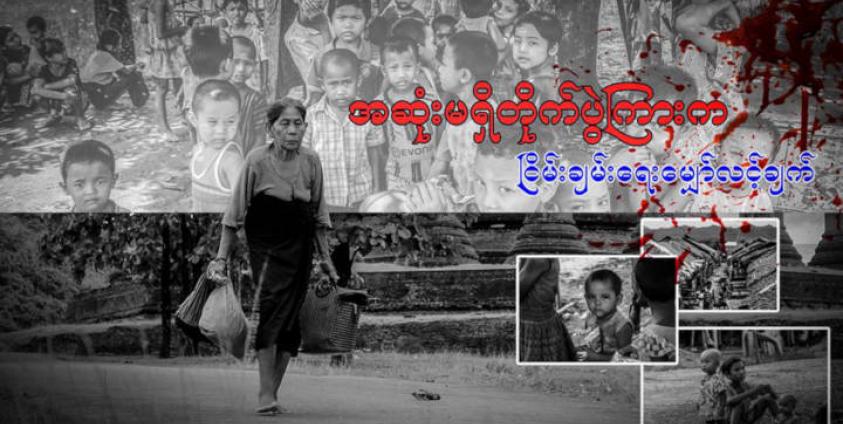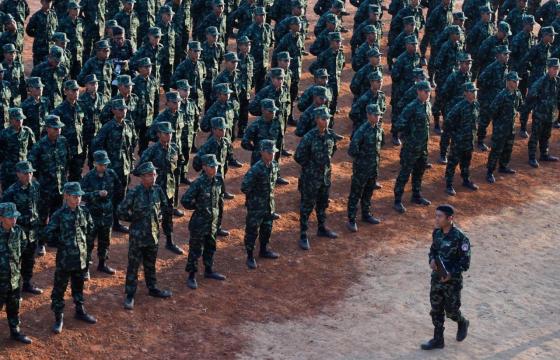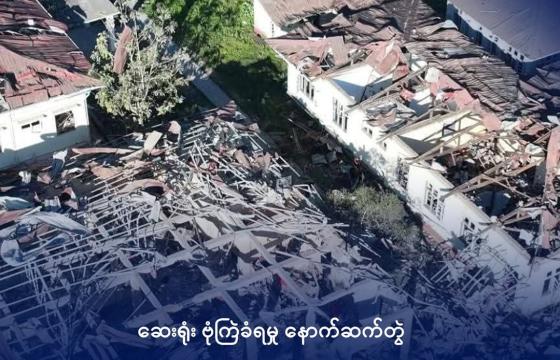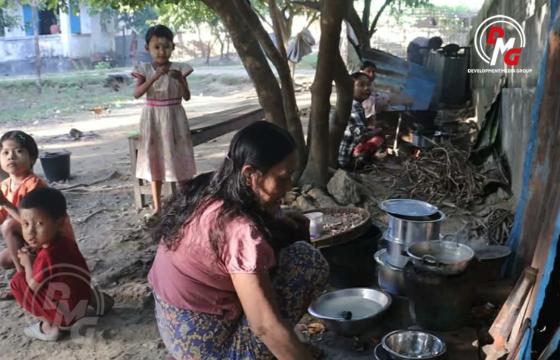Nay Myo Linn — Fighting between the Tatmadaw and the Arakan Army that began in late 2018 has displaced more than 150,000 civilians in Arakan State. Although it has been more than a year, there is no sign of the hostilities coming to an end anytime soon.
The AA has said their armed struggle aims to return the sovereignty of Arakan State to its people. During a speech at an event marking the 11th anniversary of the Arakan Army’s founding, AA chief Major General Twan Mrat Naing said his troops would continue their armed struggle for the restoration of Arakan State’s sovereignty and freedom.
The Myanmar government, meanwhile, has ordered the Tatmadaw to “crush” the Arakan Army, and earlier this year declared the AA to be an unlawful association and terrorist group.
Neither side looks ready to cede ground, nor seek peace. Regarding the war in Myanmar’s west, there is no end in sight.
The Arakan Army was established in 2009 in Laiza, Kachin State, and clashes with the Tatmadaw started when the AA entered Arakan State in 2015, through Paletwa Township in Chin State. Fighting flared intermittently in the following years until December 2018, when the conflict took on a decidedly more intractable quality. In the months since, prospects for peace appear to be growing ever dimmer, with both sides digging in their heels as clashes have grown more frequent and intense.
The current conflict dynamics have also evolved with respect to battlefield geography: Clashes previously broke out in forests and other generally rural environs, but increasingly the fighting is taking place near villages and towns.
As a consequence, the civilian casualty count is rising, and the ratio of combatant to civilian casualties is increasingly weighted toward the latter.
And civilians are victims of conflict in other ways too: Arbitrary arrests and torture are frequently reported as the warring parties accuse civilians — often in a scattershot and baseless manner — of harboring allegiance to the other side. Honest and blameless men, women and children are suffering losses in conflict areas, but the armed groups never take responsibility for these situations.
As long as clashes continue, the rule of law will be lacking in the towns and villages of Arakan State. Robberies in crowded downtown locales; stabbings on the sides of busy roads; shootings in broad daylight; and detentions on dubious justifications of “suspicion” — these are the consequences of increasingly frequent clashes in the region, instilling fear in the hearts of residents.
Case in point: Earlier this month, four people made off with more than K180 million (US$124,000) in a Kanbawza Bank branch heist in Sittwe, with three of the perpetrators still at large.
The administrative and law enforcement apparatuses in Arakan State are under extreme strain these days. Several police officers have been killed or injured, and local administrators have been subject to arrests, abductions and threats, prompting many to resign their posts in fear. These are the frontline defenders of the rule of law in towns and villages across Arakan State, but increasingly they cannot be relied upon because they are worried for their own safety and that of their families.
Myanmar will hold a general election in November and political parties are busy preparing to contest the nationwide poll. In Arakan State, elections might take place in townships where conflict is ongoing.
It is essential to ensure security for people while they are voting. Given the robberies, murders and other violence witnessed in Arakan State in recent months, residents are currently afraid even just to leave their homes, and are not likely to venture to the polls without seeing a greater semblance of law and order.
It’s clear that there is a link between the criminality we see on the streets of Arakan State’s towns and villages, and the conflict between the Tatmadaw and the Arakan Army. For this reason, both sides should lay down their arms and come to the negotiating table in search of a lasting peace. Otherwise, the people will not be secure physically or economically.
Since the government declared the AA to be an unlawful association/terrorist group in March, clashes between the Tatmadaw and the AA have been escalating and tensions between them have risen.
At a May 30 news conference, President’s Office spokesperson U Zaw Htay said the government would continue to conduct counterterrorism operations against the AA but added that “it does not close the path to negotiate” a peace agreement with the AA.
Under the current circumstances, the AA has gained much support among the Arakanese people. Therefore, designating the AA as an unlawful association and terrorist group could damage prospects for national reconciliation and negatively affect relations between Arakanese people and the government. With this in mind, the government should rescind its declaration against the AA, cease hostilities and immediately commence peace negotiations.
De-escalation of conflict will strengthen the rule of law, which will in turn contribute to a sense of security and harmony among the people of Arakan State.







